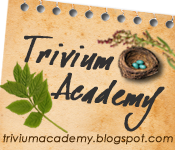It has been a while since I first wrote about this (August 23) so I will recap what I am doing. I am a plan-ahead type of person, I already know what curriculum we will be using next year all except science.
We use The Well-Trained Mind as our academic guide for homeschool and for second grade (earth science), Usborne encyclopedias are suggested for use with a few activity books. In comparison to prepackaged curriculums this is a very relaxed approach which focuses more on discovery and ignitng a spark of interest in the child than rote memorization of facts. What I also like about this approach is that it is easier to feel comfortable about exploring a topic further without feeling like we're getting off schedule.
These are some questions I was concerned about in the beginning of this project:
- Will I give her enough information to keep that spark of interest alive and growing?
- Can I find resources for experiments easily and inexpensively?
- Can I create grade-level lessons myself?
I found out the answer is "YES!" to all the questions. If you are curious to see what prepackaged curriculums I looked at go to The Science Project Part Two.
The problem that I had with the prepackaged curriculums was they seemed geared toward older children or my expectations didn't match up with the product. Some were very pricey, especially when you added in the materials, experiments and extra books to purchase.

This is how I'm creating lesson plans based on WTM's suggestions. I have purchased Usborne's First Encyclopedia of Our World ($9.95) and First Encyclopedia of Space ($9.95).
These are the core spines of the lessons. I also acquired More
Mudpies and Magnets, as per WTM's suggestions. I have decided not to use it because the experiments don't mesh well with the
 studies of the two encyclopedia books. I have decided to use The Geography Book by Caroline Arnold. I'm still figuring this out.
studies of the two encyclopedia books. I have decided to use The Geography Book by Caroline Arnold. I'm still figuring this out. Please don't get me wrong, these books are merely WTM's suggestions, you don't have to use them, there are comparable books available on the market. I found Kingfisher's First Science Encyclopedia for $2.00 at Goodwill, which I might use a supplement throughout the year just because we have it.
Other titles that are suggested for supplements are: Glow-in-the-Dark Constellations, Stargazer's Guide to
 the Galaxy ($6.99) and, Spotters Guide to the Night Sky (Spotter's Guide). I personally don't think you need all these books. It would be best to realistically think about how you're going to incorporate viewing the night sky and constellations and choose the books that you'd best utilize, of course it would be best to preview these books in a bookstore before purchasing them.
the Galaxy ($6.99) and, Spotters Guide to the Night Sky (Spotter's Guide). I personally don't think you need all these books. It would be best to realistically think about how you're going to incorporate viewing the night sky and constellations and choose the books that you'd best utilize, of course it would be best to preview these books in a bookstore before purchasing them.If you live near a Books A Million, Barnes and Noble or other bookstore, most of the time they will order a book for you for you to preview before purchase. This does save money on shipping, allows you to look at
 the book before committing and the best part is being able to take the book home with you once you made the decision. Another plus is all the bookstores have a discount club of some sort that you can utilize.
the book before committing and the best part is being able to take the book home with you once you made the decision. Another plus is all the bookstores have a discount club of some sort that you can utilize.We have a telescope but if we didn't, we would buy one. A few other purchases that we want to make is a planetarium and maybe a rock and fossil hands-on activity. I found this Activity Rock Kit at Rainbow Resource for $4.75. We're going to use a few of these items as Christmas presents (shh, I didn't tell you that). Instead of purchasing a solar system model, we're going to make one, probably out of foam balls.
Science is quickly becoming one of my favorite subjects to teach, there are just so many ways to spark the imagination with hands-on activities and it's not just about making crafts to stick on a shelf. An additional plus is that when children do something hands-on, the experience stays with them longer than just reading a book about it. The more hands-on activities we do in art, science, history stay with them longer, and that mamma pride comes out when they share their excitement with others!
I am currently creating lessons with activity sheets, experiment pages, nature journal entries, suggested books to read (biographies, non-fiction and fiction), science vocabulary words, and other features this time.
I need to go back and redo the life science lessons I've already done to make it a more complete package. I will probably create lesson plans for the entire grammar cycle but this is still to be determined. I will be posting about when the Earth/Space Science lessons are done so that you can download them for yourself for free. With the holidays approaching and knowing what church/family commitments I have, the project completion date is estimated for February/March 2007.




























No comments:
Post a Comment